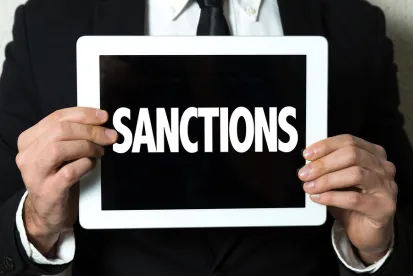On January 10, 2020, President Trump issued a new Executive Order that imposes the latest in a series of economic sanctions on Iran. Individuals and entities violating these and other sanctions on Iran can face significant civil and criminal penalties and may see funds and other assets associated with sanctions violations or sanctioned Iranian entities blocked by U.S. authorities and cooperating financial institutions. Moreover, violators of the sanctions can themselves be designated on U.S. denied party lists, effectively cutting off their access to the U.S. market and financial system and freezing their assets.
Given that most direct and indirect U.S. trade and transactions with Iran are already subject to U.S. primary sanctions,1 the latest action will mainly impact third country companies, financial institutions, and investors doing business with or related to the sectors of the Iranian economy designated under the Executive Order. Specifically, anyone who is determined to operate in the construction, mining, manufacturing, or textile sectors of Iran – as well as anyone engaging in a “significant transaction” for the sale, supply, or transfer to or from Iran of goods or services used in one or more of those sectors – can be added to U.S. sanctions lists and have their property and interests in property blocked. In addition, foreign financial institutions that conduct or facilitate “significant transactions” related to the designated sectors of the Iranian economy or blocked persons can be prohibited from accessing the U.S. financial system, including the maintenance of correspondent accounts and payable-through accounts. Foreign financial institutions covered by this prohibition include not only banks but also securities or commodities exchanges (and brokers and dealers), clearing corporations, investment companies, and employee benefit plans.
The Executive Order does not define what constitutes a “significant transaction” that would trigger the secondary sanctions. Previously, however, the U.S. Treasury Department’s Office of Foreign Assets Control (OFAC), which administers and enforces the Iran sanctions, has stated that a transaction may be found to be “significant” based on multiple factors such as (i) the size, number, frequency, and nature of the transaction; (ii) the level of awareness of management of the transaction and whether or not the transaction was a part of a pattern of conduct; (iii) the nexus, if any, of the transaction to a blocked or sanctioned Iranian entity; (iv) the impact of the transaction on the foreign policy and national security goals of the United States vis-à-vis Iran; (v) whether the transaction involved any deceptive practices; and (vi) any other factors OFAC deems relevant on a case-by-case basis. Given this multi-factor test and the current U.S. policy to put “maximum pressure” on the Iranian regime via the sanctions, it should be expected that not just large-scale or high-value transactions will be found to be “significant.” In that regard, the latest Executive Order opens a new front in ongoing U.S. efforts to pressure third countries to disengage from Iran and the Iranian economy.
Finally, while the Executive Order does not alter current U.S. license exceptions that permit the limited sale of food, agricultural commodities, medicine, and medical devices to Iran, companies considering such sales should take care to ensure that all such sales strictly comply with the substantive and procedural requirements of these license exceptions. For example, companies that may be considering providing agricultural commodities, food, medicine, or medical devices to Iran that could be used by the Iranian “manufacturing” sector to produce downstream products should conduct careful diligence on the end use and end user of their products and may wish to consider seeking a license or further guidance from OFAC before proceeding.
1 Generally speaking, “primary sanctions” are those that apply to transactions that involve a U.S. nexus, such as U.S. persons, U.S. companies and their overseas subsidiaries, U.S. goods and services, and/or the U.S. financial system.





 />i
/>i


